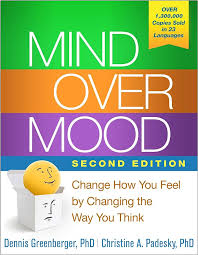Mind Over Mood” is a well-regarded self-help book written by Dennis Greenberger and Christine A. Padesky. First published in 1995, it is designed to help individuals understand and manage their emotions through cognitive-behavioral therapy (CBT). The book is highly praised for its practical approach and has become a cornerstone for therapists and patients alike.

Overview of “Mind Over Mood”
“Mind Over Mood” is structured as a workbook, providing readers with exercises, worksheets, and practical tools to apply CBT techniques in their daily lives. The primary focus is to help individuals identify and change negative thoughts and behaviors, thereby improving their emotional well-being.
Key Concepts of “Mind Over Mood”
- Cognitive-Behavioral Therapy (CBT)
- The foundation of “Mind Over Mood” is CBT, a well-established psychological approach that emphasizes the connection between thoughts, feelings, and behaviors. CBT posits that by changing negative thought patterns, individuals can alter their emotional responses and behaviors.
- Mood Assessment
- The book provides tools for assessing mood, including rating scales and mood logs. This helps readers track their emotions over time and identify patterns that contribute to their mental health issues.
- Identifying Negative Thoughts
- One of the critical steps in CBT is recognizing negative thoughts that lead to emotional distress. “Mind Over Mood” teaches readers how to spot these thoughts and understand their impact on mood.
- Challenging Negative Thoughts
- The book offers strategies for challenging and reframing negative thoughts. By questioning the validity of these thoughts and considering alternative perspectives, readers can develop a more balanced outlook.
- Behavioral Activation
- “Mind Over Mood” emphasizes the importance of engaging in positive activities to improve mood. Behavioral activation involves scheduling and participating in activities that bring joy and satisfaction.
- Problem-Solving Skills
- The book provides a framework for effective problem-solving, helping readers tackle life’s challenges in a constructive manner.
Structure of the Book
“Mind Over Mood” is divided into several chapters, each focusing on different aspects of CBT and emotional regulation. Key chapters include:
- Understanding Your Moods
- This chapter introduces the concept of mood tracking and helps readers identify their emotional patterns.
- Identifying Negative Thoughts
- Readers learn to pinpoint negative automatic thoughts that contribute to their emotional distress.
- Changing Negative Thoughts
- Techniques for challenging and altering negative thoughts are presented in this chapter.
- Behavioral Activation
- This chapter emphasizes the importance of engaging in positive activities and provides strategies for doing so.
- Developing Problem-Solving Skills
- Readers are guided through a step-by-step process for effective problem-solving.
Practical Exercises
“Mind Over Mood” is known for its practical exercises and worksheets, which are integral to the book’s effectiveness. Some of these exercises include:
- Mood Logs
- Readers are encouraged to keep daily mood logs to track their emotional states and identify triggers.
- Thought Records
- Thought records help individuals document negative thoughts and challenge them with evidence-based reasoning.
- Behavioral Experiments
- The book includes exercises for testing negative beliefs through real-life experiments, helping readers see the impact of changing their thoughts and behaviors.
- Activity Scheduling
- Readers are guided to schedule enjoyable and meaningful activities, promoting behavioral activation.
Applications in Therapy
“Mind Over Mood” is widely used by therapists as a supplemental tool in CBT sessions. Its structured approach and practical exercises make it an excellent resource for both therapists and clients. Therapists often assign exercises from the book as homework, helping clients practice CBT techniques between sessions.
Success Stories
Many readers have reported significant improvements in their mental health after using “Mind Over Mood.” Success stories often highlight the book’s accessibility and practical nature. Individuals struggling with depression, anxiety, and other emotional disorders have found relief through the techniques presented in the book.
Conclusion
“Mind Over Mood” is a comprehensive and practical guide for anyone looking to improve their emotional well-being through cognitive-behavioral therapy. Its structured approach, combined with practical exercises and worksheets, makes it an invaluable resource for both therapists and individuals seeking self-help. The book’s enduring popularity is a testament to its effectiveness in helping people understand and manage their moods, ultimately leading to a more balanced and fulfilling life. Other Books – introduction to algorithms / Research Design 6th Edition /the last trainer
Purchase Information
“Mind Over Mood” is available for purchase through various online retailers. It is recommended to buy from reputable sources to ensure you receive the most updated edition of the book. Online shops often offer the book at competitive prices, and it is available in both print and digital formats. If you are considering buying “Mind Over Mood,” check for any ongoing promotions or discounts to get the best deal.
